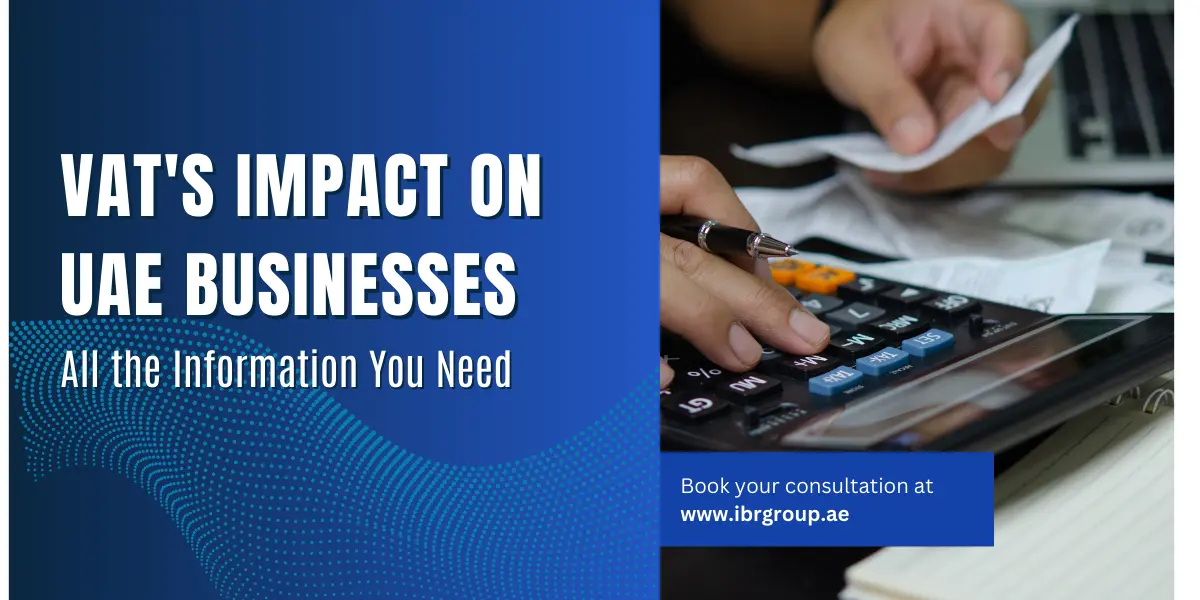
Impact of VAT on UAE Businesses: All the Information You Need
Impact of VAT on UAE Businesses: All the Information You Need
Many nations, like the United Arab Emirates (UAE), have made value added tax (VAT) a crucial component of their economies. Since its implementation in 2018, VAT has had a major impact on how firms in a variety of industries operate and arrange their finances. It is essential for compliance, optimization, and strategic expansion to comprehend how VAT affects firms in the United Arab Emirates. This blog explores the nuances of VAT in the United Arab Emirates, providing businesses with information on its advantages, disadvantages, and professional advice.
Understanding Value Added Tax (VAT) in the UAE
VAT is a consumer tax that can be imposed on the value added to goods and services at every stage of the production or distribution chain. It is an indirect tax to the final consumer because the seller does not bear the burden when collecting it from his buyers and sending it to the government; rather, the tax is transferred through the supply chain of businesses within the options until the end consumer. VAT makes it easy for a business to eliminate the portion of the tax that is attributed to its inputs, thereby shifting the tax burden to the final consumer.
The UAE's VAT history
Beginning on January 1, 2018, the United Arab Emirates, one of the GCC’s member states, incorporates VAT into its previous economic strategy. The goal of the UAE’s diversification strategy is to wean the country off of its excessive reliance on oil earnings. In this regard, the VAT was implemented as a consistent and long-term revenue stream to fund public services and infrastructure in the United Arab Emirates. Prior to the implementation of the VAT, the UAE’s revenue was primarily derived from non-tax sources, such as oil exports.
UAE VAT Rates
Compared to most other countries, the UAE has a relatively low standard VAT rate of 5%. The majority of goods and services provided within the nation are subject to this standard rate. To lessen the impact of VAT on vital industries and services, there are, nevertheless, a few special exemptions and zero-rated supplies.
Supplies with a zero rating include:
• Goods and services exported from countries outside the GCC
• International transportation and the materials it uses
• Provision of several forms of land, air, and sea transportation, such as all kinds of ships and airplanes
• Brand-new residential properties
• A few educational products and related services
Supplies that are exempt include:
• Life insurance is one type of financial service.
• Revenue from residential real estate other from the original supply of recently constructed homes
• Deals involving undeveloped land
• Local services for passenger transportation
In order to support a level and equitable VAT system, these exclusions and zero-rated classifications aid in lessening the total effect of VAT on necessities. The VAT paid on inputs can be recovered by the company that offers zero-rated goods and services, but not by the company that offers exempt goods and services.While the government continues to receive the money stream, these distinctions support the vital components of healthcare and education.
Influence on Various Business Domains
Shop
The retail industry was forced to modify pricing strategies, improve cash flow management, and, in essence, accurately calculate VAT and file it on time when it came into effect.
Production
As a result, manufacturers are left with input VAT at the level of raw materials and output VAT at the level of produced goods. At the same time, they are exacerbated by the responsibility of effectively handling the input tax credit and adhering to the intricate supply chain regulations.
Property
Depending on whether the property is a residential or business residence, real estate has a wide range of VAT implications. To avoid any disagreements or fines, accurate classification and documentation are essential.
Hospitality
be permitted to include VAT in facility costs. Additionally, they should make sure that they correctly apply it to a number of services, including food sales and accommodation rents.
However, the majority of healthcare services are exempt from VAT, however some associated goods and services are not. Because of this, healthcare professionals find it difficult to adhere to these exemptions.
Because VAT is imposed at every stage of production and sale, it facilitates transparency and lowers the possibility of tax evasion, which benefits businesses by ensuring a more equitable distribution of tax costs across the economy. Since firms can recover the VAT on inputs to lower their own tax treatment, VAT also encourages tax compliance for a wide range of additional reasons. Systems for providing relief for different regimes may also result in the streamlining of compliance and administration processes, which lowers costs for organizations.
Despite the fact that VAT has several benefits, most firms face certain difficulties when implementing it. These include the administrative load associated with VAT compliance, such as managing VAT invoices, filing returns, and maintaining records. The complex VAT requirements and the constantly evolving tax laws present the other difficulty. In particular, it will make doing business more expensive for industries with narrow profit margins.
Businesses can adjust to handling VAT in a number of ways, such as by investing in robust accounting systems and providing training to employees on how to use them to ensure effective compliance with the regulations; routinely reviewing and updating internal processes, which can streamline VAT procedures and reduce errors; and consulting tax experts to get professional advice on how to best adapt to the complex VAT law in order to optimize the overall tax position. In order to properly report and calculate the amount of tax owed, it is also necessary to maintain precise and transparent records.
In accounting for a refund of the VAT paid on company inputs, the VAT refunds have always been a crucial component of the VAT system mechanism. In order to protect businesses from the resulting cash flow issues and the financial burden of VAT, the procedures for the VAT refund should be precise and timely. However, receiving a VAT refund is never simple, especially in countries with bureaucratic, paperwork-heavy procedures. Businesses are expected to ensure that they have fulfilled all eligibility requirements and, consequently, submit late claims in order to be eligible for reimbursements.
VAT can have a wide range of implications for SMEs, some of which are detrimental and others of which are quite beneficial. Smaller firms may be required to register for VAT, but they also have the opportunity to claim the VAT they paid on their purchases, which lowers their overall tax burden. SMEs may still be disproportionately affected by compliance costs, particularly those with less resources and less experience. The necessity to pay VAT on sales before they are paid may also have an adverse effect on their cash flow. In order to help SMEs handle VAT requirements and the impact they have on them, governments and tax authorities frequently look for ways to support and advise them.
Pricing generally has a significant impact on business success by influencing profitability and market competitiveness. Setting and maintaining prices in accordance with cost structures, market situations, and customer perceptions of value is known as strategic pricing. The majority of businesses employ a range of strategies, such as penetration pricing, which uses cheap rates to draw clients in the early stages, or skimming, which uses high prices to maximize profits from early adopters. Dynamic pricing, on the other hand, allows prices to be adjusted based on variations in demand, competition activity, and even inventory levels thanks to real-time data.
Value-Added Tax compliance is made easier by technology, which increases accuracy and automates processes. By automating VAT calculations, modern software solutions help to reduce the possibility of human error throughout the calculation process and, ultimately, ensure compliance with complicated and constantly evolving tax laws. In order to give current insights into the company’s VAT responsibilities and to help the business file appropriate returns on time, sophisticated data analytics and reporting systems collect all information in real time. Accordingly, technology enhances the integration of financial systems, resulting in increased transaction transparency and traceability.
Since free zones are typically excluded from the VAT regime in order to encourage trade and investment, this creates an intriguing situation. There are two types of free zones in the United Arab Emirates: designated zones and non-designated zones. Goods that are supplied from one designated zone to another or from one designated zone to a non-designated zone are not subject to VAT. However, VAT will apply to supplies going to and coming from non-designated zones and the mainland. In order to get the most out of their location, businesses operating in free zones must be aware of these rules and adhere to them.
Global Viewpoint
From the implementation and impact of Value-Added Tax (VAT), the variance between countries is diverse, reflecting various economic situations, governmental aims, and administrative capacities. VAT is a significant source of income for the European Union and the majority of other regions, although transactions, regulatory requirements, and tax evasion are issues for firms. This would aim to unify VAT processes for improved worldwide tax compliance in cooperation with international organizations like the OECD.
VAT's future in the UAE
With the expanding economy, the UAE’s Value Added Tax is set to undergo additional improvement and modification. Since it was first implemented in 2018 at a rate of 5%, the Value-Added Tax has significantly increased revenue, diversified the government’s revenue streams, and lessened its reliance on oil. Future enhancements could take the shape of adjustments to the VAT rate, expansions of the industries subject to the VAT, and better execution.
